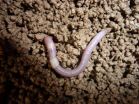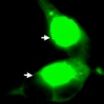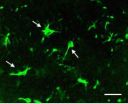(Press-News.org) Pesticides have a direct impact on the physiology and behaviour of earthworms, a Danish/French research team reports after having studied earthworms that were exposed to pesticides over generations.
"We see that the worms have developed methods to detoxify themselves, so that they can live in soil sprayed with fungicide. They spend a lot of energy on detoxifying, and that comes with a cost: The worms do not reach the same size as other worms, and we see that there are fewer of them in sprayed soil. An explanation could be that they are less successful at reproducing, because they spend their energy on ridding themselves of the pesticide", the researchers, Ph. D. student Nicolas Givaudan and associate professor, Claudia Wiegand, say.
Claudia Wiegand is from the Department of Biology at University of Southern Denmark, and she led the research together with Francoise Binet from University Rennes 1 in France. Nicolas Givaudan is doing his Ph. D. as a joint degree between University of Southern Denmark and University of Rennes 1 in France. They researchers reached their findings by metabolomic profiling and energetic parameters.
The researchers set up an experiment to study the behaviour of the earthworm species Aporectodea caliginosa. They moved two portions of farmed soil with worms into the lab. One portion was taken from a local organic field, the other from a local conventionally cultivated field that had been sprayed with fungicide for 20 years. This soil had remnants of the internationally commonly used fungicide Opus® at a level common in fields. When crops are sprayed with fungicide, only a small part of the chemical is absorbed by the plant. The waste can be up to 70 per cent, and much of the fungicide ends up in the soil.
In the laboratory, the researchers could see how the fungicide-exposed worms adapted to the toxic environment. Over generations the worms have developed a method to detoxify themselves.
"The fungicide increased metabolism rate in the worms, both the adapted worms and the not adapted worms. In the not adapted worms we saw that their energy reserve of glycogen was used faster. Contrastingly, only in the adapted worms we saw that amino acids and protein contents increased, suggesting a detoxification mechanism. "They also increased their feeding activity, possibly to compensate for the increase in energy demand", the researchers said.
Often there are 2 - 3 times more earthworms in unsprayed soil than in sprayed soil.
"The reason for this may be that earthworms in sprayed soil do not reproduce as successfully as worms in unsprayed soil, because they need to spend more energy on detoxifying", the researchers say.
They also weighed the worms in the experiment and found that the worms exposed to fungicide weighed only half of the worms in organic soil. Worms in organic soil had an average weight of 0.6 grams, worms in conventionally cultivated soil had an average weight of 0.3 grams.
INFORMATION:
The earthworm research is a collaboration between the University of Rennes 1 in France and University of Southern Denmark. The work is financed by a grant of the European University in Brittany, France, to Claudia Wiegand.
Facts about earthworms
Darwin was the first to wrote about how earthworms affect the soil. This he did in his last book, "The formation of Vegetable Mould through the Action of Worms", 1881.
There are several families of earthworms. Approx. 25 species live in Denmark, all belonging to the family Lumbricidae. In Denmark, the longest earthworm reaches approx. 20 cm (Lumbricus terrestris), while the Australian giant earthworm (Megascolides australis) reaches almost 3.5 meters.
Earthworms mainly feed on organic matter such as decaying leaves, hyphae and bacteria. The material is broken down and transported into the soil, and the burrowing activity brings air in to the soil.
ref: Acclimation of earthworms to chemicals in anthropogenic landscapes, physiological mechanisms and soil ecological implications. Soil Biology and Biochemistry, Volume 73, June 2014.
Contact
Nicolas Givaudan, PhD, Department of Biology. nicolasg@bioloogy.sdu.dk. Phone: +45 6550 2333.
Claudia Wiegand, Associate Professor, Department of Biology. wiegand@biology.sdu.dk. Phone: +45 6550 2785 and +45 6011 2220.
Pesticides make the life of earthworms miserable
2014-03-25
ELSE PRESS RELEASES FROM THIS DATE:
RI Hospital: Number of patients admitted with antibiotic-resistant infections is rising
2014-03-25
PROVIDENCE, R.I. – The emergence of community-acquired infections, such as urinary tract infections (UTI), due to strains resistant to common antibiotics are on the rise, according to Rhode Island Hospital researchers. The study is published online in the journal Antimicrobial Resistance and Infection Control.
"Over the last several years, we've seen an increase in the number of bacteria -- many of which are forms of E. coli -- that are resistant to commonly administered antibiotics," said Leonard Mermel, D.O., medical director of the department of epidemiology and infection ...
Twenty-five percent of breast cancer survivors report financial decline due to treatment
2014-03-25
ANN ARBOR, Mich. — Four years after being treated for breast cancer, a quarter of survivors say they are worse off financially, at least partly because of their treatment, according to a new study led by University of Michigan Comprehensive Cancer Center researchers.
In addition, 12 percent reported that they still have medical debt from their treatment.
Financial decline varied significantly by race, with Spanish-speaking Latinas most likely to be impacted. Debt was reported more frequently in English-speaking Latinas and Blacks, the study found. Results appear in ...
Blood test may help predict whether a child will become obese
2014-03-25
Scientists have found that a simple blood test, which can read DNA, could be used to predict obesity levels in children.
Researchers at the Universities of Southampton, Exeter and Plymouth used the test to assess the levels of epigenetic switches in the PGC1a gene – a gene that regulates fat storage in the body.
Epigenetic switches take place through a chemical change called DNA methylation which controls how genes work and is set during early life.
The Southampton team found that the test, when carried out on children at five years old, differentiates between children ...
Kids' books featuring animals with human traits lead to less learning of the natural world
2014-03-25
TORONTO, ON – A new study by University of Toronto researchers has found that kids' books featuring animals with human characteristics not only lead to less factual learning but also influence children's reasoning about animals.
Researchers also found that young readers are more likely to attribute human behaviors and emotions to animals when exposed to books with anthropomorphized animals than books depicting animals realistically.
"Books that portray animals realistically lead to more learning and more accurate biological understanding," says lead author Patricia ...
MRI reveals genetic activity
2014-03-25
CAMBRIDGE, MA -- Doctors commonly use magnetic resonance imaging (MRI) to diagnose tumors, damage from stroke, and many other medical conditions. Neuroscientists also rely on it as a research tool for identifying parts of the brain that carry out different cognitive functions.
Now, a team of biological engineers at MIT is trying to adapt MRI to a much smaller scale, allowing researchers to visualize gene activity inside the brains of living animals. Tracking these genes with MRI would enable scientists to learn more about how the genes control processes such as forming ...
Coerced sex not uncommon for young men, teenage boys, study finds
2014-03-25
WASHINGTON - A large proportion of teenage boys and college men report having been coerced into sex or sexual behavior, according to research published by the American Psychological Association.
A total of 43 percent of high school boys and young college men reported they had an unwanted sexual experience and of those, 95 percent said a female acquaintance was the aggressor, according to a study published online in the APA journal Psychology of Men and Masculinity.
"Sexual victimization continues to be a pervasive problem in the United States, but the victimization ...
Long-term productivity higher in university spin-offs than in other companies
2014-03-25
The study, published in the journal Technovation and written by Pere Ortín Ángel and Ferran Vendrell Herrero, covers financial data from two comparison samples of companies founded between 1994 and 2005. One sample is made up of 104 university spin-offs and the other is made up of 73 technology-based, non-university companies. The study compares what is known as the total factor productivity of these two samples. According to the study, in the university spin-offs this productivity is, on average, lower in the year in which the company is founded. Nevertheless, data shows ...
Autophagy in the initial stage is unrelated to the composition of beclin 1 complex
2014-03-25
Alteration of the autophagic process is involved in neurodegeneration. The beclin 1 complex is shown to play a key role in the initial stage of autophagy. Dr. Yanming Wei and co-coworkers from College of Life Science, Northwest Agriculture & Forestry University in China pointed out the amyotrophic lateral sclerosis-linked Cu/Zn superoxide dismutase 1 G93A mutant can upregulate autophagic activity in NSC34 cells, but that this does not markedly affect beclin 1 complex components. The relevant paper has been published in the Neural Regeneration Research (Vol. 9, No. 1, 2014).
INFORMATION:
Article: ...
Lipid rafts participate in the renewal of brain neurons in Alzheimer's disease
2014-03-25
Research over decades has implicated aberrant autophagy and lysosomal function as reliable markers and therapeutic targets for neurodegenerative diseases. Lipid rafts are shown to participate in lysosomal reproduction, and some lysosomal storage diseases are proposed to result from the accumulation of lipids in late endosomal/lysosomal compartments. Prof. Lin Yuan and team from Southern Medical University in China review the influence of lipid rafts on the progression of Alzheimer's disease through the modulation of aberrant autophagic-lysosomal pathway of amyloid-ß peptide, ...
Dab2: How to attenuate brain injury due to Alzheimer's disease?
2014-03-25
Transforming growth factor-beta (TGF-β) type II receptor (TβRII) levels are extremely low in the brain tissue of patients with Alzheimer's disease. This receptor inhibits TGF-β1/SMAD signaling and thereby aggravates amyolid-beta deposition and neuronal injury. Dab2, a specifc adapter protein, protects TβRII from degradation and ensures the effective conduction of TGF-β1/SMAD signaling. Prof. Jun Liu and team from Norman Bethune First Hospital of Jilin University in China used an adenoviral vector to overexpress Dab2 in the APP/PS1 transgenic mouse ...




